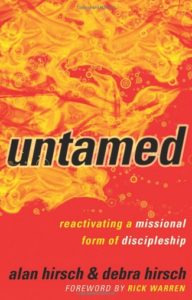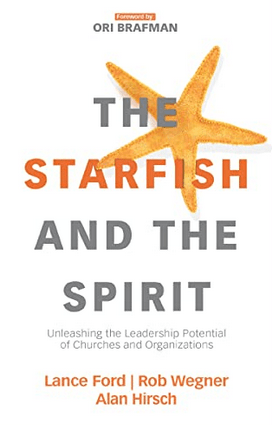 Untamed: Reactivating a Missional Form of Discipleship
Untamed: Reactivating a Missional Form of Discipleship
by Alan & Debra Hirsch
The Hirschs partnered to produce a challenging and needed book on discipleship, which is the heart of the Great Commission. Believing that the success of the mission of God depends on our getting discipleship right, they write:
To be a truly radical disciple does require a relentless evaluation of life’s priorities and concerns, together with an ongoing, rigorous critique of our culture, to ensure we are not adopting values that subvert the very life and message we are called to live out.
We sincerely believe discipleship has become a frontier issue for the people of God at this time in history. And most commentators would agree that in sincerely seeking to appeal to the prevailing consumerist culture, the Western church has all but lost the art of discipleship. (p.23)
The authors see an unbreakable link between true discipleship and mission.
We take the missional agenda of the church with utmost seriousness. You simply cannot be a disciple without being a missionary – a sent one. For way too long discipleship has been limited to issues relating to our own personal morality and worked out in the context of the four walls of the church with its privatized religion… To strive for holiness and maturity in our own personal lives is extremely important, but it is only half the picture; the other half is our God-given responsibility to the world around us. The fact is that you can’t be a disciple without being a missionary: no mission, no discipleship. It’s as simple as that. (p.29)
Section One: The Untamed God
jeebus made me do it
Jesus’ holiness was compelling, drawing the outcasts and marginalized of society while repelling self-righteous hypocrites. By spending time with prostitutes, tax collectors, adulterers, Roman soldiers, Samaritans, and Gentiles,
Jesus shows us that one cannot achieve holiness by separation from the unclean… The holiness of Jesus, it seems, is a redemptive, missional, world-embracing holiness that does not separate itself from the world, but rather liberates it. (p.46)
Writing of the dangers of the herd mentality, Hirsch says:
Groupthink is not necessarily a Christian virtue, and we should not mistake a crowd for a community of Christ followers… If we are not careful, churches can easily develop a herd mentality, a crowd instinct that will tend to penalize dissenting voices and actions. The church, however, is destined for an individual and corporate responsibility to God that will almost inevitably put us at prophetic odds with society around us. (p.50)
your god is too sick
In this chapter, the authors address the tendency we have to form God in our own deformed image.
It is because of the all-too-human propensity for rationalization and self-deception that we fail in discipleship… Worship isn’t just about singing songs to God, listening to sermons, partaking in the liturgy, or even simply praying. It must include loving our neighbor, seeking justice for the downtrodden, evangelism, and the renewal of true community. (p.78)
the spirit’s edge
In this chapter, the authors take a look at holiness, which they define, as I do, more along the lines of being set apart to God’s purposes – The Great Commission.
When we talk of God as being holy or Jesus as holy, or of the Holy Spirit, we must resist the temptation to see holiness in moralistic terms, or else we do violence to the idea of the redeeming God and end up seeing God as the ultimate moralist!… Holiness begins with God, flows into our own hearts and our lives, moves from there into the community, and eventually reaches every aspect of life the world… Holiness is not gained by withdrawal from the world but by active, redemptive engagement in the world. Instead of looking at holiness as a list of “don’t’s,” see it as a list of “do’s”…
Another dimension of biblical holiness is the idea of consecration: of being set aside to do a distinct task. True holiness involves clearing the desk, setting selfish agendas aside, and being willing to partner with God in the redemption-sanctification of the world by doing all things – the everyday things – in his name and for his glory. (pp.92-93)
The Hirschs make the point that the mission of God is found in his triune nature:
“God sends his Son into the world. The Father is a sending God, and the Son is a sent one. And the Father and the Son send the Holy Spirit.” (p.95)
Section Two: The Untamed Culture
kultcha-schmultcha
The authors address the powerful impact of our consumerist culture upon the church and disciple making.
If we, in a sincere attempt to reach contemporary audiences, reconfigure the processes of Christian formation, putting the challenge of discipleship off to the end, then, in our opinion, we are opening the floodgates to being “evangelized” by the culture. When we remove Jesus’s preconditions to following him and use professional mass entertainment (no matter how sincere) to draw people to Christ, we should not be surprised at the results – we simply can’t entertain consumers into becoming disciples, nor can people consume their way into following Jesus. (p.110)
The authors address society’s attraction to Mammon and the Market.
When we look at the power of consumerism and the market in our lives, we are thoroughly convinced that we are dealing with a very significantly religious phenomenon: if the role of religion is to mediate a sense of identity, purpose, meaning, and community, it can be said that consumerism fulfills all these criteria. (p.117)
They give some practical ways to escape the clutches of our culture in order to be more authentic Christ followers.
the church that Jesus built
The implicit message church members get from a church that adopts a consumer-driven model (with marketing and all) is that they are essentially discerning consumers and that the local church is a vendor of religions goods and services. No longer is the church a disciple-making medium operating under the Great Commission; rather, the church is viewed as existing to serve my spiritual needs… In this case community exists for me, not me for the community. (pp.138-139)
The very language of “getting fed” at church betrays the fact that any attendees are not disciples at all, but rather passive (and somewhat dependent) consumers. (p.139)
Hirsch addresses the harmful effect that ordination has on Christianity as a people movement. We give lip service to the “priesthood of the believer,” but ordination actually establishes a clergy-laity divide that disenfranchises the average follower of Christ.
If one wanted to destroy the sheer transformative power of the body of Christ as a people movement, then the creation the clergy-laity divide is nothing less than a stroke of demonic genius. (p.143)
In movements it is important to distribute power and function to the outermost level… one of the biggest shifts needed is to de-professionalize the ministry/clergy class and give ministry back to the people of God. This doesn’t mean that we do not have leaders: any movement that makes any impact has definite leadership. They simply don’t confuse leadership with ministry. Not all are leaders, but all are ministers. Leadership is calling within a calling. (p.144)
Hirsch also encourages the church in America to more fully address the issue of women in ministry. He feels that we cannot afford to relegate women to a secondary status in the church if we are going to impact the world as we should.
Next the authors talk about
“undercover discipling,” writing: “…discipleship is not just for those who have accepted Jesus as their Lord and Savior – it’s for everyone!” (p.146)
Their argument is that unbelievers can be discipled to Christ. We depend on the Spirit to convert people, but our job is to disciple. This is how Jesus did it. None of the apostles were born again believers when he began the process.
Reframing mission and evangelism around discipleship makes space for long-term, authentically loving relationships with the various people in our lives. This in turn will give credibility to our message and space for real and meaningful friendships – something we are not always known for. (p.151)
The next topic addressed pertains to center-set (or open-set) and boundary-set groups.
Conceiving church as an open set engenders a truly Christ-centered approach t0 holding together, unlike the more standard religious organizations with their theological and cultural boundaries and formulas developed to keep certain people in and others out. Rather than seeing people as Christian or non-Christian, as “in” or “out,” we would see people by the degree of distance they are from the center…. this kind of movement allows for a sense of belonging before believing. (p.154)
The authors suggest that the way we practice communion should be influenced by the open-set model. They admit that doing church in this manner will be messy, but that is the cost of following Jesus, the untamed Lord.
refocusing the family
In this chapter, the Hirschs address the need for hospitality in our family structure if we are to be genuine disciples.
Surely our lack of hospitality points to something deficient in our culture, our sense of missional obligation, and therefore also our discipleship. (p.165)
They argue that our pursuit of the materialistic dream has robbed us of experiencing family as God wants. As a result of our family time being compressed due to external pressures, we have become extremely protective of preserving what little time is left to us, thereby eliminating hospitality to outsiders from the mix. This makes us missionally ineffective.
We must deny the idolization of the nuclear family in favor of seeing the church as the family of God. Jesus redefined family around the community of disciples. (Matthew 12:48-50) If we prioritize seeking first God’s kingdom with our families, our families will be blessed more than we can imagine.
Section Three: The Untamed Self
the lying mirror
Seeing the image of God in people generates compassion. Henri Nouwen makes the point that if we have true compassion for people, then we will not focus primarily on their outward behavior. (p.196)
too sexy for the church
Discipleship involves knowing and being known by God through Jesus and living our lives in the kingdom of God. As followers of Jesus, we are not called to a vague and undefined spirituality but to a spirituality that exists within the context of discipleship. (p.215)
Section Four: The Untamed Mission
going out, going deep
If missional defines our being sent out into the world, then incarnational must define the way in which we engage the world. (p.234)
If we are to follow Jesus, we need to make intentional choices to move out of our religious zones and be where the people are. It will require that we come into direct social contact with others and become a regular part of the natural rhythms of the community. (p.238)
We don’t “bring God” with us into any situation – he’s there long before you or I arrive on the scene. We simply need to discern God’s prevenient work in people’s lives and join with him. (p.243)
Identification on the level of the heart implies a certain intimacy with the people you are trying to reach… Incarnation of the heart can be costly, so we often avoid it. (pp.246-247)
Following the logic of the incarnation itself, our message is heard properly only when we have gone through the process of identifying with people,hearing them, understanding the issues they face, humbly living with them, and knowing how they experience and express their search for meaning. (p.248)
afterword: a call to untamed adventure
There are two kinds of people in the world; those who live the adventure, and those who only read about others living the adventure. (p.258)
Hirsch wrote that he determined to be one who lives the adventure. How about you?



